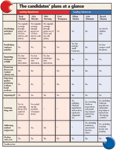Article
Election 2008: Candidates sound off on healthcare
The major parties' leading presidential contenders would take the country in very different directions.
To prepare for this article, Senior Editor Wayne J. Guglielmo reviewed the campaign materials of each of the candidates whose positions are detailed below.
Few issues tap as deeply into the philosophical wellsprings of the two major parties as healthcare does.
The partisan battle this fall over SCHIP-the State Children's Health Insurance Program-is a case in point, despite defections to the other side by typically loyal Republicans. (In mid-October, the House upheld a presidential veto.) The philosophical divide is also evident in the presidential race, although even here there have been a few unexpected turns.

And yet with the exception of Ohio Rep. Dennis Kucinich, none of the Democratic candidates, leading or trailing, has tacked too far to the left in the primary campaigns in order to appeal to the party's traditionally liberal base. Sen. Clinton, for instance, does her best not to rock the boat of the millions of middle-income people who have employer-based or individual insurance, and like it.
In contrast, the leading Republican candidates-Rudy Giuliani, Fred Thompson, Mitt Romney, and John McCain (R-AZ)- have cleaved fairly closely to the party's conservative base. Whether that will change in the general election is unclear. (At press time, former Arkansas Gov. Mike Huckabee was rising in the GOP rankings.)
What is clear is that, unlike the Democrats, the Republicans want to minimize government's role, principally through a series of taxed-based incentives that would encourage Americans to purchase health insurance on the private market. Even former Gov. Romney has thus far tacked further to the right, declaring that his own Massachusetts health plan, a classic Republican-Democratic compromise, is not right for every state.
How the leading candidates compare
The leading Democrats seem eager this time around not to repeat the mistakes of the early 1990s, when the first Clinton health plan, spearheaded by then First Lady Hillary Clinton, was rolled out. There's greater emphasis now on choice, shared responsibility, and affordability. And though each of the leading candidates still wants universal coverage, the mechanisms by which they would reach that ambitious goal, many observers point out, have changed significantly.
Not significantly enough, say the Republicans. Former Gov. Romney's response to Hillary Clinton's plan typifies their reaction: "It's government insurance, not private insurance. . . . It's a European-style socialized medicine plan-that's where it leads-and that's the wrong direction for America."
Universal coverage. Each of the leading Democratic candidates has adopted the individual mandate, to varying degrees. Both Clinton and Edwards require all Americans to obtain health coverage, but Edwards offers special exemptions "in cases of extreme financial hardship or religious beliefs." And Obama's mandate applies only to children.
Under Clinton, people would either retain their existing coverage or select from one of two options: a broad array of private plans under the aegis of the Federal Employees Health Benefits Program (FEHBP) or a Medicare-like public plan. Under Edwards, people not enrolled in Medicare, Medicaid, SCHIP, or an employer-based program would be eligible to buy coverage through a series of regional Health Care Markets, which would offer a choice between private and public coverage.





